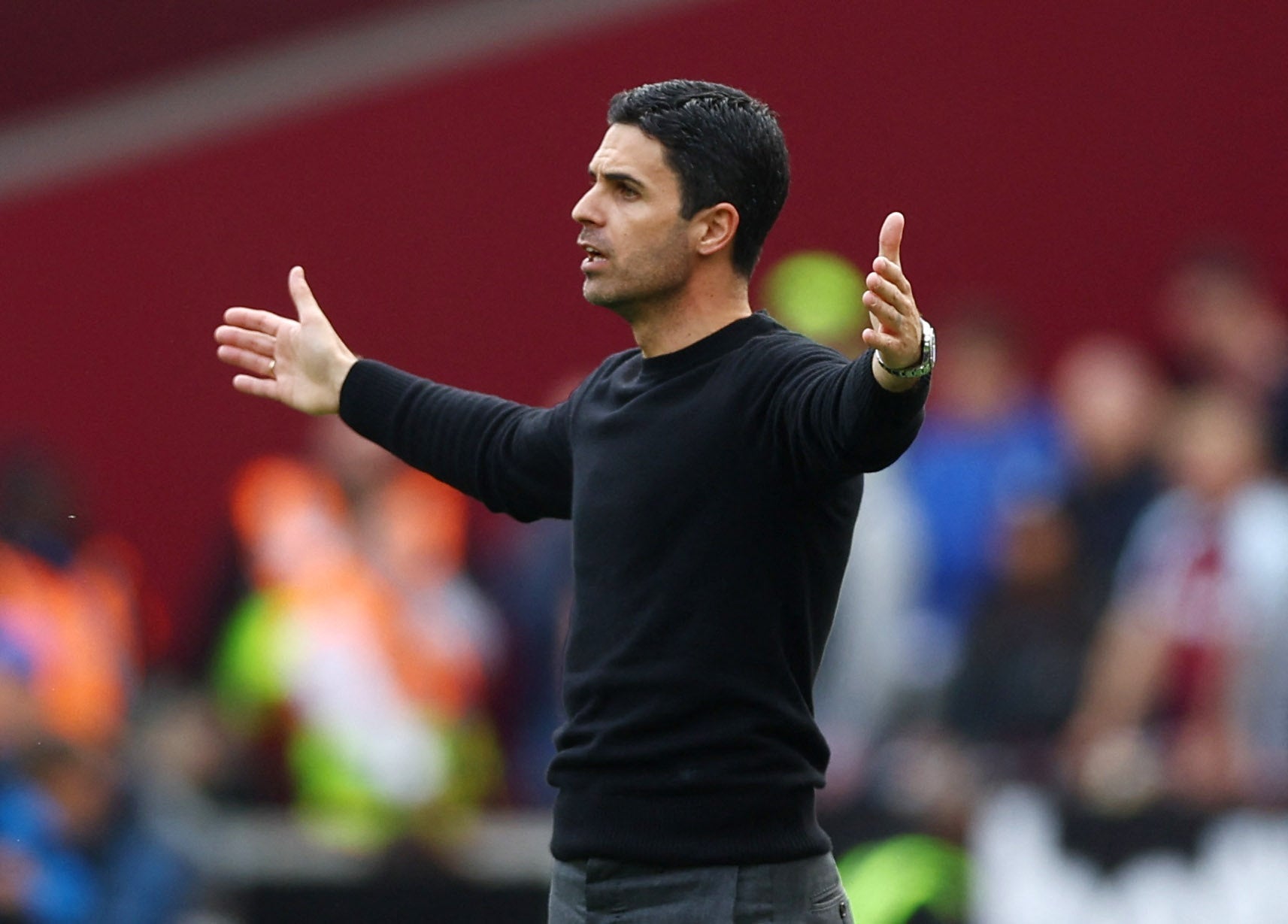Why Arsenal losing the title race could be for the greater good
Mikel Arteta’s side have dropped points for the second week in a row, but they’re not bottling the title race – they’re facing the reality of taking on this Manchester City

Your support helps us to tell the story
From reproductive rights to climate change to Big Tech, The Independent is on the ground when the story is developing. Whether it's investigating the financials of Elon Musk's pro-Trump PAC or producing our latest documentary, 'The A Word', which shines a light on the American women fighting for reproductive rights, we know how important it is to parse out the facts from the messaging.
At such a critical moment in US history, we need reporters on the ground. Your donation allows us to keep sending journalists to speak to both sides of the story.
The Independent is trusted by Americans across the entire political spectrum. And unlike many other quality news outlets, we choose not to lock Americans out of our reporting and analysis with paywalls. We believe quality journalism should be available to everyone, paid for by those who can afford it.
Your support makes all the difference.In the immediate aftermath of Arsenal’s latest collapse, Mikel Arteta was furious but also conflicted. It is the contradiction that often comes with his managerial approach, as well as a title race. Arteta wanted to lay into the mistakes his side made against West Ham, but also knows he needs to keep them confident and focused for the seven crucial games to come; onto the next one as there is still work to be done.
“The best way to do it is to convince the team how good they are,” the Arsenal manager said. So it was when he was asked whether the pressure of it all is getting to his team.
“I would say yes if I saw a team playing from the beginning like that,” Arteta responded, before making a choking sound. In keeping with that entire approach, he then used some classic psychological terms.
“When I see a team playing with that flow, that’s not. At 2-0 certainly it’s not the pressure, it’s that we misunderstood what the game needed in that moment."
The latter point is telling. At 2-0, the game was as good as won, almost nothing to think about. Very quickly, however, a spirited West Ham gave Arsenal a lot to think about. Arteta's side quickly started playing as if they had everything to lose. That was painfully visible.
The Basque also said that you have to have been a player to “feel” that in the moment but, from everything that happened, it’s impossible not to conclude that his side are feeling the reality of a title run-in for the first time. And, much more pointedly, a title run-in against this Manchester City. Near perfection is demanded.
On this, there are a lot of concerns and criticisms for Arsenal.
Most pertinently, for really the first time in months, they have put the trophy back in City’s hands. That is of huge psychological significance. Pep Guardiola and his team can now see that, if they win all of their games, they will be champions again. They no longer need favours. Arsenal have now done them two. It is hard not to think City will only be emboldened by that, as they rise to even better form. Arsenal are meanwhile faltering, having watched four points evaporate through the loss of successive 2-0 leads.
These draws largely came from a sudden loss of control. Games where they were cruising descended into chaos, most of that in Aaron Ramsdale’s box, the other end of the pitch almost clear. This was what should be most troubling. Against West Ham, in particular, there was no late siege of the type you would usually associate with title-chasing teams looking for a winner. There was little enough of anything at all.

Arteta later bemoaned how his side didn’t have “that ruthless mindset in that moment to kill a team”. It was worse than that. They were killing their own build-ups with bad passes, of the type they weren’t making in the first 10 minutes let alone the first few months of the season.
Questions can similarly be asked of Arteta himself, and some surprising in-game decisions of his own.
It all looked like a group experiencing a title race for the first time. It all looked like this was a group fully aware of the stakes.
This is also where there is another side to this, and why criticism of Arsenal should only go so far. It is not that they have fatal flaws when it comes to a title race, it is that a title race against this City means drop-offs like this are almost certain to be fatal.
It is after all only two away draws, regardless of the nature of them. In a normal run-in, of the type that has existed for over 130 years of English football history, drop-offs like Arsenal’s would be considered part of the drama of it all rather than potential conclusions. These 2-2 draws, even allowing for the concern of the comebacks, wouldn’t have such stakes.
Back in 2011-12, for example, City themselves drew two and – coincidentally – lost 1-0 at Arsenal, in a bad run that looked like it could cost them the title. The difference then was that Abu Dhabi had not yet owned the club for years, and everything was still in its formative stages.
We’re now long past that, as well as long past title races of such forgiving margins. The project is reaching a peak, as may well be landmarked with a treble.
That is something that should always be remembered with the modern Premier League. Nothing about this is “normal”.

An autocratic state has bought a club for political purposes and built it up to a level where it is the most lavishly funded in history, a gleaming worldwide project. That has meant that, in order to have a chance at winning the league, any challenger has to get at least 90 points. The likelihood right now is that City end up with somewhere between 90 and 94.
That certainly isn’t “normal”. If teams can even get 90 points on a regular basis, something has gone wrong in football, and that is a problem that goes way beyond City. It was already in the post before the 2008 takeover. Their ownership is just the issue at the very top of all this, the product of a game that has greedily embraced hypercapitalism but is now causing even greater consequence. It’s “the game eating itself”, as the phrase goes.
Many will of course point to the genius of Guardiola, and that is beyond doubt. But he is just part of it. City were not just able to afford his wages and requests, but also able to afford the most perfect possible infrastructure for the Catalan. Arteta knows this only too well, having worked at City for so long.
The net effect of all this is that it creates a hugely high threshold to win a title, one that puts immense demands on teams to reach.
You only have to look at how Liverpool hit 97, 99 and 92 points and only lifted the trophy once. That would be unimaginable for most of English football history. Liverpool are possibly feeling the cost now.
It points to another potential contradiction about this season.
It would arguably be a bad thing for Arsenal to win the league because it perpetuates the illusion that the Premier League is still as competitive as ever, and doesn’t have a huge problem. All of this is without even discussing the fact City have been charged with multiple alleged breaches of Financial Fair Play rules.
Instead, if City win yet another title – to make it five in six, a historic third in a row, to potentially go with a treble in a grand display of power – it might wake more people to the reality.
For now, Arsenal are feeling the reality of a title race against this City. Of course they are feeling the pressure.



Join our commenting forum
Join thought-provoking conversations, follow other Independent readers and see their replies
Comments